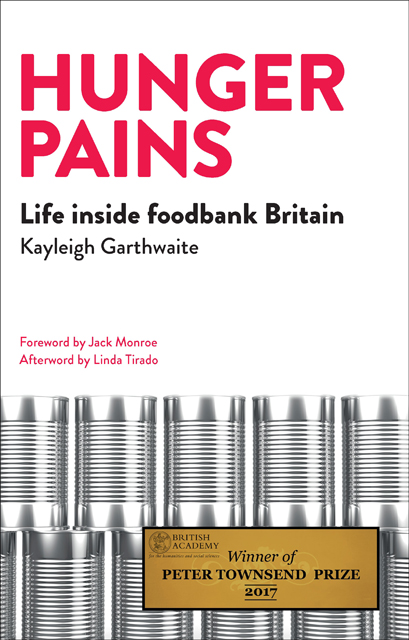Book contents
- Frontmatter
- Dedication
- Contents
- List of figures and boxes
- Acknowledgements
- Foreword by Jack Monroe
- Introduction
- one Researching foodbank use
- two Foodbanks: what do they do?
- three The politics of foodbank use in the UK
- four Why do people use a foodbank?
- five All work, low pay: finding, keeping and doing precarious jobs
- six “Doing the best I can with what I’ve got”: food and health on a low income
- seven Stigma, shame and “people like us”
- Conclusion: is foodbank Britain here to stay?
- Afterword by Linda Tirado
- Notes
- Bibliography
- Index
Conclusion: is foodbank Britain here to stay?
Published online by Cambridge University Press: 15 April 2023
- Frontmatter
- Dedication
- Contents
- List of figures and boxes
- Acknowledgements
- Foreword by Jack Monroe
- Introduction
- one Researching foodbank use
- two Foodbanks: what do they do?
- three The politics of foodbank use in the UK
- four Why do people use a foodbank?
- five All work, low pay: finding, keeping and doing precarious jobs
- six “Doing the best I can with what I’ve got”: food and health on a low income
- seven Stigma, shame and “people like us”
- Conclusion: is foodbank Britain here to stay?
- Afterword by Linda Tirado
- Notes
- Bibliography
- Index
Summary
The writing of this book was motivated by the hundreds of people I met over the course of two years spent inside the foodbank as both a volunteer and a researcher. I wanted to make their voices heard above the political and media commotion that the growing use of emergency food aid has caused in Britain. ‘Emergency’ food provision suggests that there is a social safety net that will eventually take effect – but this has been called into question by the experiences presented in this book. We have seen how foodbank use is growing, due to static incomes, rising living costs, low pay, fuel poverty, debt and other complicated problems related to welfare reform. Added to that is the relentless ‘shirkers’ and ‘strivers’ dialogue that surrounds people on low incomes, eroding any last scraps of dignity they may have left. As a result of this, people at the sharp end are mostly existing, not living, and this unsurprisingly leads to stigma, shame and embarrassment for many who are desperately trying to make ends meet. This book has emphasised the realities and voices of people using the foodbank who are struggling to survive, but who are mostly refusing to give in.
But what does the future look like for foodbank Britain?
Are foodbanks here to stay?
Foodbanks would not need to exist if it weren’t for the harsh benefits sanctions, precarious, low-paid jobs, and administrative delays that leave families without money for weeks on end. The hundreds of people I met did not want to come to the foodbank. It was not something they planned to do because they didn’t fancy going to Tesco for their food shopping. It was a last resort, a tipping point into a whole new realm of indignity. People came to the foodbank so they could spend their last few quid on fuel to avoid bringing their new-born baby into a house without any heating or electricity, like Gemma, whom we met in the Introduction. They came to the foodbank when they were waiting for their ESA appeal to be heard, but were too afraid of what could happen if they tried to claim other benefits, like Jamie. For others, like Malcolm and Naomi, the foodbank was a last resort when even the cheap, processed foods that people knew were bad for them had run out.
- Type
- Chapter
- Information
- Hunger PainsLife inside Foodbank Britain, pp. 149 - 160Publisher: Bristol University PressPrint publication year: 2016



